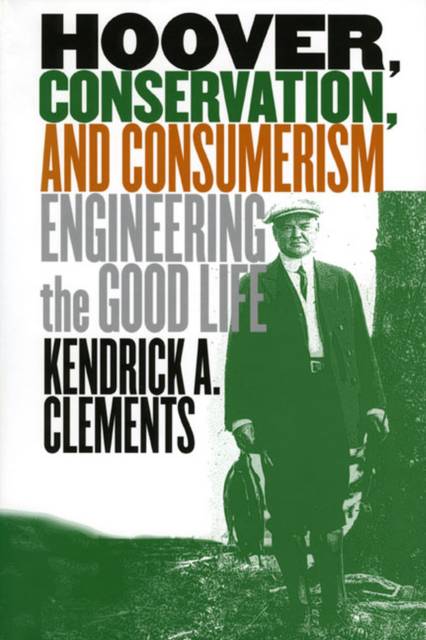
- Retrait gratuit dans votre magasin Club
- 7.000.000 titres dans notre catalogue
- Payer en toute sécurité
- Toujours un magasin près de chez vous
- Retrait gratuit dans votre magasin Club
- 7.000.0000 titres dans notre catalogue
- Payer en toute sécurité
- Toujours un magasin près de chez vous
Hoover, Conservation, and Consumerism
Engineering the Good Life
Kendrick A Clements
Livre relié | Anglais
68,45 €
+ 136 points
Description
Herbert Hoover rose to political leadership in the 1920s, just as consumer society became dominant in the United States. Although personally uncomfortable with the values of consumerism, he worked to strengthen the economy through policies of conservation and to find desirable occupations for the new leisure available to modern workers. He envisioned great voluntary programs to promote standardization and simplification in American industries that would permit companies to pay both high profits and high wages. And he sought opportunities for healthful, moral outdoor recreation to fill the leisure hours made possible by rising worker productivity. Kendrick Clements illuminates the influence of Hoover's broadly conceived ideas about conservation on virtually every economic policy of the Republican era, from the expansion of the National Park system by 40 percent to the attempt to eliminate radical swings in the business cycle. Locating the roots of Hoover's personal beliefs in his Quaker upbringing in Oregon and seeing his outlook on the natural world shaped by his frontier experience and education, Clements finds that this policy maker combined an interest in conserving the environment with an engineer's drive to rationalize the use of natural resources. He examines Hoover's difficult negotiation of the Colorado River Pact that permitted the construction of the dam that would bear his name as well as his efforts to create a St. Lawrence Waterway to link the Great Lakes to the Atlantic Ocean. Hoover's relief efforts during the 1927 Mississippi River flood and his promotion of timber and oil conservation reveal other dimensions of his approach to conservation. Although Hoover was not a modern environmentalist, he pioneered some of the first broad environmental policies in the United States. The National Conference on Outdoor Recreation brought together wilderness advocates and urban planners, passage of the first federal law to limit oil pollution in navigable waters began an ongoing effort to control the effects of industrialization, and his advocacy of pleasant, affordable housing introduced the idea that the world we live in every day is our most important environmental concern. In a period most often seen as a wasteland by historians who have viewed Republican environmental policies of the 1920s as mistaken, ineffective, or corrupt, Clements proposes that Hoover's conservation efforts were an attempt to balance growth and conservation. This unparalleled examination of early-twentieth-century conservation speaks to ongoing debates about how best to protect the environment without ruining the economy.
Spécifications
Parties prenantes
- Auteur(s) :
- Editeur:
Contenu
- Nombre de pages :
- 352
- Langue:
- Anglais
Caractéristiques
- EAN:
- 9780700610334
- Date de parution :
- 27-01-00
- Format:
- Livre relié
- Format numérique:
- Genaaid
- Dimensions :
- 159 mm x 237 mm
- Poids :
- 662 g

Les avis
Nous publions uniquement les avis qui respectent les conditions requises. Consultez nos conditions pour les avis.






